Gender specifics of physical culture university students' self-determination process
Фотографии:
ˑ:
Theory and Practice of Physical Culture № 12 2016
Associate Professor, PhD Y.A. Kutsenko1
Master's student G.A. Kutsenko1
1Tyumen State University, Tyumen
Keywords: vocational self-determination, gender specifics, vocational preferences, labour market, physical culture university students.
Background. The problem of young people's self-determination in the context of their professional identity when entering the modern labour markets to join and contribute to the productive capacities of society is still very critical. “Professional self-determination of a personality is a complicated and long process taking a significant period of life. Its success, as a rule, is determined by the degree of agreement of the individual mental abilities with the content of and requirements to the professional careers, and the personality adaptation potential activated by the varying social and economic conditions in the career-making process” [9].
In opinion of N.S. Pryazhnikov [6], the individual vocational self-determination process implies the individual consciousness being enough developed with the relevant values-based control system being enough formed to give the means to adequately model own future and design ideal professional personality standards. A human personality self-determination process is driven by the socially accepted notions about ideals, behavioural models and responsibilities. Presently it is the social orientation that largely determines the individual professional consciousness, self-determination and career priorities.
The vocational identification or professional self-determination is presently one of the most important decisions in anybody’s life and a powerful tool for the individual self-assertion. In the modern market conditions, it is the right vocational identification that gives a young individual every opportunity to acquire the desired social status. The benefits and losses of the society on the whole and individuals in particular will depend on how successful the young men and women are in their vocational identification being made with due consideration for their personal gifts, preferences and interests versus the actual needs of the national economy on the whole and the target location in particular [1, 8].
Study reports by many authors consider different aspects of the individual professional self-determination problem [4, 5]. A.V. Radopolov [7], E.N. Kalenik, I.M. Kuptsov [3], for instance, have studied specific aspects of the values-driven orientations and motivations for the vocational identification and desired careers of the student-athletes in the context of different social factors.
In addition, within the frame of the panoramic approach to the design of an educational study [2] of certain interest and importance is also the key information on the post-graduation career forecasts for one or another specialty.
Topicality of the physical education university students’ vocational self-determination issues is largely due to the social status of the educator’s (teacher’s, coach’s, instructor’s) job and specific aspects of the university students’ community viewed as a special-socio-psychological group.
Objective of the study was to make a comparative analysis of the gender specifics in the physical culture university graduates’ vocational self-determination process.
Methods and structure of the study. To identify the students’ preferences for different jobs within the national physical culture and sports sector and the reasons to move to a different field within the sector, we used a set of blank forms designed by a few researchers (N.B. Stambulova, V.I. Tropnikova, L.A. Yasiukova) to develop our own methodology customized to the students’ population under the study. The study was performed in September 2014 through September 2015 at the premises of Physical Culture Institute of Tyumen State University. Subject to the study were 76 fourth-year students of the above Institute majoring in the following disciplines: 38 people (24 men and 14 women) majoring in Athletic Training and Physical Education; plus 38 second-year students of the masters’ course. Age of the bachelors and masters subject to the study averaged 22 and 26 years, respectively. The respondents were grouped based mostly on the following conditions: they were trained by the same university; they were all subject to generally the same influences of the mass media organizations; and they were all willing to get a higher educational background.
Study results and discussion. Our analysis of the students’ polling data on the future vocational preferences of the Physical Culture Institute (PCI) bachelors found 4 group preferences in the national physical culture and sports sector (see Figure 1), being as follows: 55% of the respondents preferred coaching; 30% sport management; 10% physical education teacher and 5% sport instructor career.
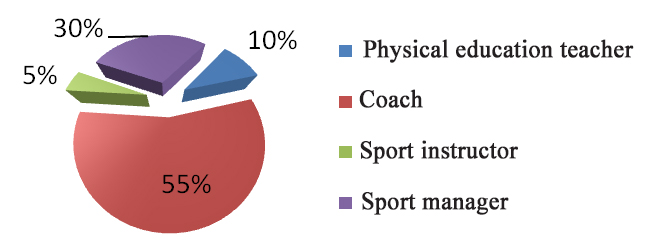
Figure 1. Polled students’ vocational preferences in the physical culture and sports sector
Gender profiling analysis of the above data on the Physical Culture Institute graduates’ vocational preferences is given hereunder in Figures 2 and 3. It should be noted that there is a certain logic in the responses of both male and female respondents as they all tend to rank second the jobs of physical education teacher and sport instructor (14% and 10% of the men’s and 16% and 6% of the women’s responses, respectively) whilst giving a top preference to the coaching job (56% of the men’s and 43% of the women’s responses).
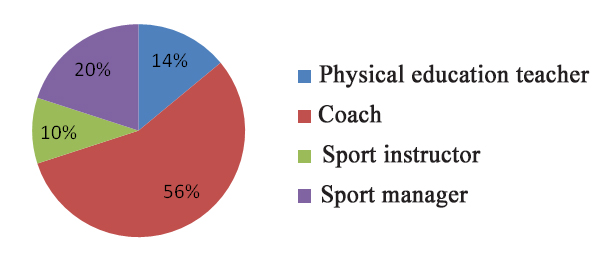
Figure 2. Gender-specific vocational preferences in the physical culture and sports sector: men polling data
The women’s responses showed the sport manager’s job being ranked second on the list of vocational preference (35% of the women’s responses) – see Figure 3.
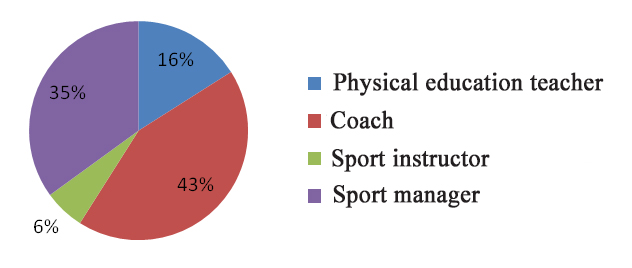
Figure 3. Gender-specific vocational preferences in the physical culture and sports sector: women polling data
Therefore, the gender-specific analysis of the students’ polling data found the vocational preferences of the Physical Culture Institute graduates manifested by their choices of the masters’ courses and expected careers in the physical culture and sports sector. It should be noted that the young women were found to rank the sport manager’s job higher than the young men.
Gender-specific data on the career choices of the male master's students (see Figure 4) show that half of the respondents (50%) are active athletes, 34% coaches and 16% sport managers.
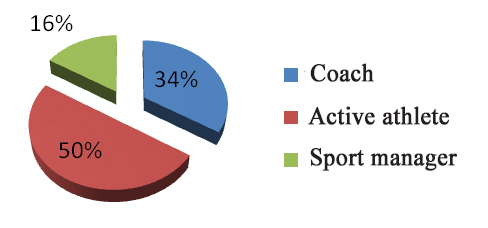
Figure 4. Careers chosen by the male master's students
It should be noted that the actual careers chosen by the female master's students are limited by only by the coaching and sport management options.
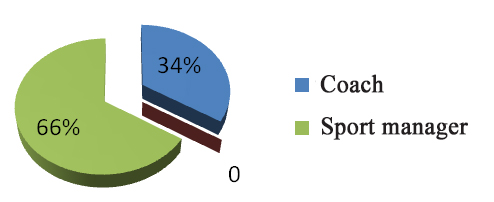
Figure 5. Careers chosen by the female master's students
Our analysis of the female master's students polling data on the chosen careers showed that 66% of them work as sport managers and 34% opted for a coaching job. It should be mentioned in this context that the actual career options in the physical culture and sports sector for female master's students are narrower than those for men.
The study data and analysis may be interpreted as indicative of the growing role and social image of the sport management profession in the modern society. The initiatives to reinstate the mass physical culture and professional sports in Russia are presently ranked among the top priorities of the national government policies and this is the reason why the demand for highly knowledgeable and skilled sport management services is growing, particularly in the context of the growing numbers of high-ranking sport events in the RF. The national sports sector is obviously in need of knowledgeable and successful managers reasonably flexible in their job functionality.
The gender-specific profiling of the vocational preferences of the Physical Culture Institute graduates gives the means to see whether or not the actual vocational preferences and career expectations of the graduates in the physical culture and sports sector match with the actual needs of the modern labour market in the region.
Conclusion. The study found and analysed the logic in the gender-specific vocational preferences and career expectations of the Physical Culture Institute graduates and highlighted the careers they opt for in the national physical culture and sport sector. It should be noted that almost one third of the Physical Culture Institute graduates opt for the sport management careers, with the young women showing a higher preference for the sport management career than the young men.
References
- Grets I.A. Sovremenny sport i sotsial'naya adaptatsiya zhenshchin (Modern sport and social adaptation of women) / I.A. Grets // Teoriya i praktika fiz. kultury. – 2010. – # 12. – P. 34–38.
- Zagvyazinskiy V.I. Obshchaya panorama pedagogicheskogo issledovaniya po problemam fizicheskoy kul'tury i sporta (Pedagogical research in physical education and sport: Overview) / V.I. Zagvyazinskiy, I.V. Manzheley // Teoriya i praktika fiz. kultury. – 2016. – # 3. – P. 3–5.
- Kalenik E.N. Osobennosti formirovaniya motivov professional'noy deyatel'nosti u studentov, obuchayushchikhsya po raznym spetsial'nostyam (Professional career motives formation specifics in students of different specialities) / E.N. Kalenik, I.M. Kuptsov. // Teoriya i praktika fiz. kultury. – 2015. – # 7. – P. 55–56.
- Klimov E.A. Psikhologiya professional'nogo samoopredeleniya (Psychology of vocational self-determination) / E.A. Klimov. – Moscow: Akademiya, 2010. – 304 p.
- Kutsenko Y.A. Sravnitel'ny analiz tselevykh ustanovok professional'noy deyatel'nosti u studentov IFK i uchiteley fizicheskoy kul'tury s razlichnym stazhem raboty (Goals of professional work of physical culture institute students and physical education teachers with different work experience: Comparative analysis) / Y.A. Kutsenko, G.A. Kutsenko / Strategiya formirovaniya ZOZh sredstvami fizicheskoy kul'tury i sporta: opyt, perspektivy razvitiya (Healthy lifestyle formation strategy by means of physical culture and sports: experience and development prospects): Proc. of the XII All-Rus. res.-pract. konf. – Tyumen: Vector Book, 2014. – P. 135-139.
- Pryazhnikov N.S. Professional'noe i lichnostnoe samoopredelenie (Vocational and personal self-determination) / N.S. Pryazhnikov. – Moscow: Institute of practical psychology, Voronezh: NPO MODEK, 2009. – 258 p.
- Rodpolov A.V. Problemy psikhologii sporta (Problems of sport psychology) / A.V. Rodpolov // Teoriya i praktika fiz. kultury. – 2006. – # 6. – P. 2-4.
- Solomchenko M.A. Pedagogicheskie usloviya, neobkhodimye dlya prognozirovaniya budushchey professional'noy deyatel'nosti studentov fakul'tetov fizicheskoy kul'tury (Pedagogical conditions for forecasting future professional work of physical education faculty students) / M.A. Solomchenko, V.V. Boyko, O.A. Gorbacheva. // Uch. zapiski un-ta im. P.F. Lesgafta. – 2016. – # 2 (132). – P. 159–164.
- Talanova S.I. Osobennosti professional'nogo samoopredeleniya starsheklassnikov (Features of vocational self-determination of senior pupils) / S.I. Talanova // Teoriya i praktika obrazovaniya v sovremennom mire (Theory and practice of education in the modern world:): Proc. of intern. scient. konf. ( St. Petersburg, February, 2012).– St. Petersburg: Renome, 2012. – P. 226–228.
Corresponding author: kusenko712@mail.ru
Abstract
The article considers the gender specifics in the professional career options preferred by the physical culture university graduates versus their academic training profiles; identifies the priority careers in the national physical culture and sports sector preferred by the polled graduates; and outlines a few trends in the context of the sport professions of highest importance for the region and local communities. The study recommends giving due attention to the gender specifics in the vocational self-determination by the physical culture university graduates to harmonize the vocational preferences of the modern graduates coming to the national physical culture and sports sector with the actual needs of the regional labour market.

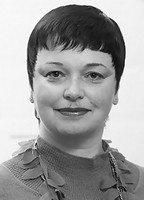

 Журнал "THEORY AND PRACTICE
Журнал "THEORY AND PRACTICE